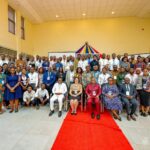The three-day China–West Africa Medical & Health Industry Expo and AI Diagnosis & Project Cooperation Summit officially opened on August 20, 2025, at the Grand Arena of the Accra International Conference Centre. Organized by the Health

Community of West Africa Association (HCOWA), the event brought together leading healthcare innovators, artificial intelligence experts, and key stakeholders from across West Africa and China to bridge gaps in healthcare delivery, foster medical cooperation, and advance Ghana’s ambition of becoming a subregional medical hub.
In his keynote address, Chief of Staff Julius Debrah reaffirmed that healthcare lies at the heart of President John Dramani Mahama’s development agenda, stressing that “government support to HCOWA to achieve its goal is not in doubt. We recognize the role its leadership is playing in bringing cutting-edge technology into health delivery”. He emphasized that although the government cannot achieve these objectives alone, the partnership with Chinese innovators would “harness global knowledge and expertise” to ensure Ghana and its West African neighbors are not left behind in the march toward modernized health systems.
Prince Opoku Dogdey, Vice President of HCOWA, described the Expo as a transformative bridge between West Africa and China in healthcare, noting that the introduction of AI in diagnostics, medical imaging, and supply chain management would address the region’s critically low doctor-to-patient ratio. He revealed plans for the establishment of factories in Ghana for medicines, reagents, and medical equipment manufacturing, explaining that “about 300 manufacturers from China are set to set up plants here in Ghana. This means jobs for our people, industrial growth, and reduced dependence on imports”. Dogdey further highlighted collaboration with the Ministry of Trade and Industry to ensure these factories create sustainable opportunities that bolster Ghana’s industrial base and health sovereignty.
The HCOWA Medical Expo showcased over 100 Chinese exhibitors, more than 500 hospitals and clinics, and attracted in excess of 1,500 medical merchants, with an estimated 20,000 visitors expected over the three days. Delegates explored the latest AI-powered diagnostic platforms capable of real-time analysis of chest X-rays, advanced medical imaging technologies, and innovative equipment designed to enhance both urban and rural care delivery. Organizers intended the event to serve not only as an exhibition but as a dynamic platform for knowledge exchange, enabling West African healthcare institutions to tap into China’s advanced technologies and for Chinese companies to identify long-term investment prospects in the region.
Beyond the exhibition halls, summit sessions convened to address crucial policy frameworks, public-private partnership models, and investment opportunities within the medical sector. Forums examined hospital management systems, next-generation surgical tools, and telemedicine models aimed at

extending specialist expertise to underserved areas. By fostering dialogue among government officials, private investors, and international partners, the summit sought to lay the groundwork for long-term infrastructure projects and technology transfer agreements that could reshape healthcare delivery across Ghana and its neighbors.
Health analysts at the ceremony argued that the HCOWA Medical Expo represents a potential turning point for Ghana’s healthcare sector, which has long grappled with inadequate infrastructure, limited local pharmaceutical production, and overburdened hospitals. They posited that collaboration between governments, the private sector, and global innovators could unlock opportunities to expand domestic manufacturing of medical supplies, strengthen system-wide capacity, and accelerate the adoption of AI-driven diagnostics. Such a trajectory, they warned, would require sustained political will, continuous investment, and robust regulatory frameworks to translate expo momentum into measurable improvements in patient outcomes.
As the summit drew to a close, all eyes remain on how Ghana’s government and private stakeholders will transform three days of high-profile exhibitions and discussions into durable partnerships that deliver tangible results for patients. By aligning strategic investments, policy reforms, and cross-continental collaboration, Ghana aims to fulfill its vision of emerging as West Africa’s preeminent medical hub—one defined not only by state-of-the-art facilities but by home-grown capacity, sustainable industry growth, and equitable access to quality care.



